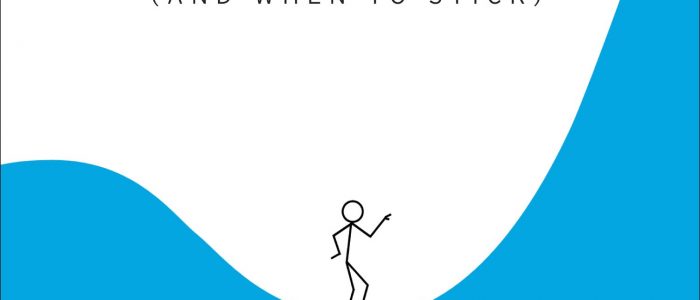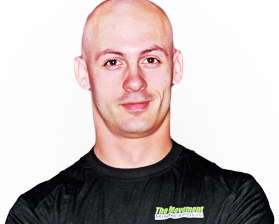
You know those questions people ask rapid-fire at the end of podcasts? It seems like everyone sourced their list from the same place because they’re often the same, and I still manage to totally flub one here and there, like this one. But anyway generally I love doing podcasts and I like that part.
So a question people often ask is what book do you give away most often, and it’s a great question because I’m always able to answer it immediately.
I’m a big fan of Seth, I met him in 2004(?). He doesn’t like shaking hands, he really doesn’t like hugging.
I’ve given away literally hundreds of copies of this book. I like it mostly because it’s not some rah-rah about how you need to keep pushing forward at all costs, but instead it’s about quitting and cutting your losses when it’s not worth pushing through.

I got to thinking of it the other day because of the big dip we went through with Lift Weights Faster Daily. Most people wouldn’t think of this, but the fact that we have a database of over 550 exercises that have all been completely photographed with beautiful and instructive exercise descriptions written for them, not to mention about 50% have instructional videos and then on top of that we have a database of over 400 workouts that are all tied back to those exercises…
Well it’s just an insurmountable dip, let’s say a competitor who wanted to copy the idea, for someone to go through. I don’t remember if Seth makes this point in the book but it’s almost like the opposite of the dip is an asset in the sense that once you go through the dip what you’re left with is a massive asset. Do I need to explain the power of assets to you? Probably not, right?
Anyway, my point is not that you should keep pushing through and persisting no matter what, nor is my point that you should quit everything!
In fact knowing which route to take is exactly the challenging part and anyone who tells you they have the answers is full of shit.
But, you should have an overarching method and strategy to how you make those decisions. Mine is borne out of the same ideas that underlie my training philosophies – ease, lack of tension and friction, and congruence and resonance with what is best for me and my body.
What’s yours?


Leave a Reply